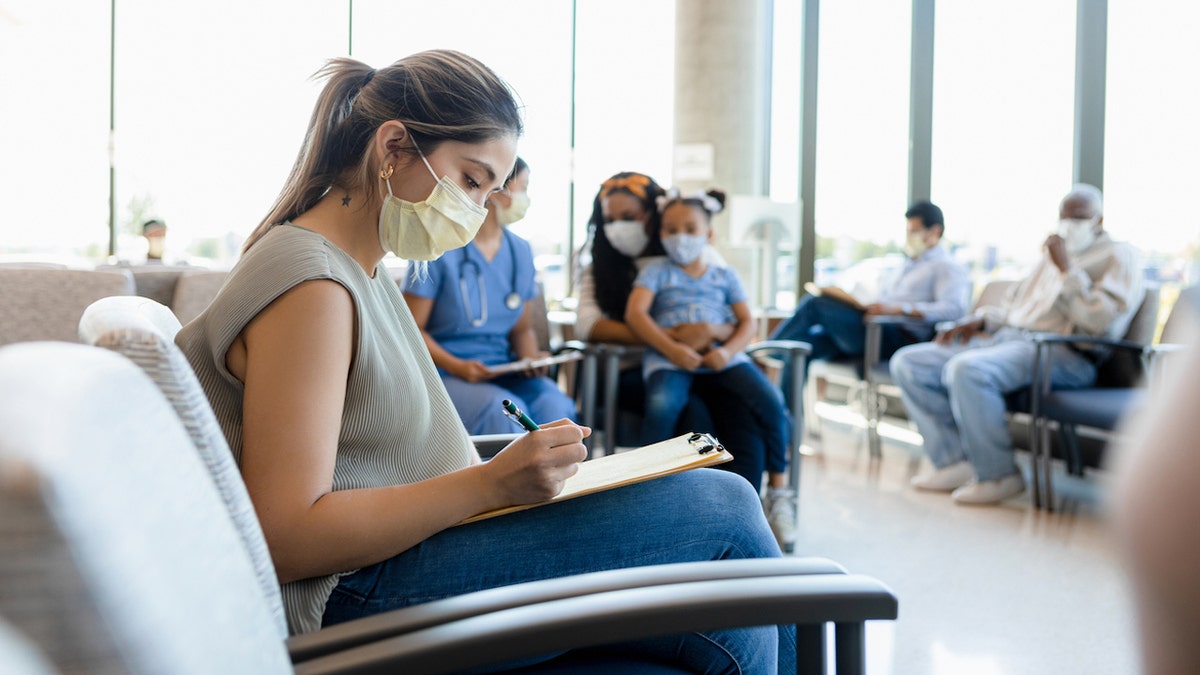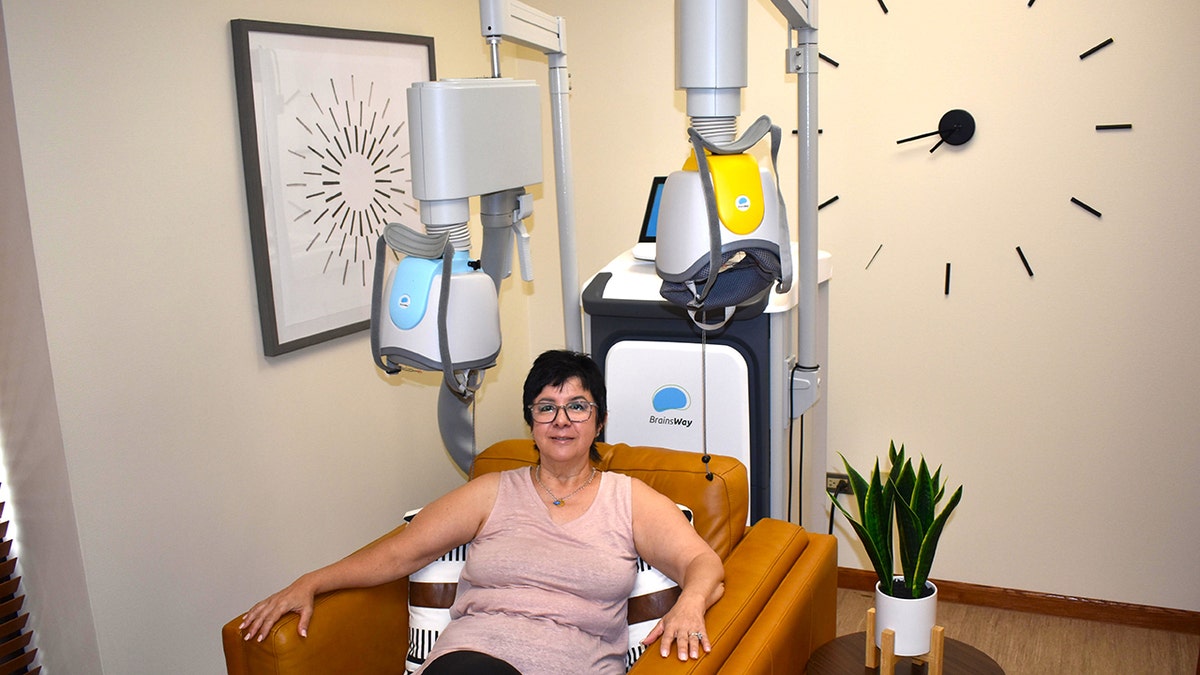Health
Tuberculosis at the border: Doctors issue warnings of ‘drug-resistant strains’

Cases of tuberculosis (TB) — an illness that kills more people than any other infectious disease — rose in the U.S. during 2022, per the Centers for Disease Control and Prevention (CDC). And some doctors are concerned that limitations of testing at the border could be partly to blame for the surge.
In 2021, the disease infected nearly 11 million people and caused 1.6 million deaths worldwide, according to the World Health Organization (WHO).
Tuberculosis is a highly contagious disease caused by a bacterial infection. It primarily affects the lungs, but can also affect the brain, kidneys and spine.
Required testing may have limitations: CDC
The CDC states that all refugees ages two and older must be tested for tuberculosis before entering the U.S.
TEXAS CITY REPORTS SYPHILIS OUTBREAK AMID ‘LIMITED SUPPLY’ OF PENICILLIN DRUG
“By law, refugees diagnosed with an inadmissible condition are not permitted to depart for the United States until the condition has been treated,” the agency states on its website.
Some doctors are concerned that limitations of testing at the border could be partly to blame for the rise in tuberculosis cases. (iStock)
The CDC uses its Electronic Disease Notification (EDN) system to notify federal, state and local health departments of any immigrants and refugees who are found to have medical conditions that require follow-up.
There are limitations to that process, however.
“By design, the EDN system only collects information for the approximately 10% of immigrants who have an overseas medical classification,” explained Neha Sood, health communication specialist for the CDC in Atlanta, Georgia, in a statement to Dr. Marc Siegel, clinical professor of medicine at NYU Langone Medical Center and a Fox News medical contributor.
“Human error likely caused some losses, resulting in possible underestimates of immigrants with medical classifications.”
“Thus, DHS [Department of Homeland Security] data were used to approximate the immigrant denominators.”
There is also some degree of human error that comes into play, Sood added.
“Because data transfer for immigrants during the study period primarily relied on staff at ports of entry to correctly review, retain and route paper forms for each immigrant with a medical classification, human error likely caused some losses, resulting in possible underestimates of immigrants with medical classifications,” she said.
DENGUE FEVER CASES COULD REACH NEAR-RECORD HIGHS THIS YEAR: WHAT TO KNOW ABOUT THE TROPICAL INFECTIOUS DISEASE
While health departments are “encouraged and provided incentives” to share the results of immigrants’ testing with the CDC, Sood said there is always the chance of “underreporting.”
She added, “The proportion of immigrants, refugees and eligible others who completed a post-arrival examination might be higher than indicated in this report.”
Although the CDC has “comprehensive surveillance systems” to track communicable diseases within the U.S., the agency does not track diseases by immigration status, Sood explained.

Tuberculosis is a highly contagious disease that primarily affects the lungs, but can also affect the brain, kidneys and spine. (Spencer Platt/Getty Images)
Linda Yancey, M.D., a specialist in infectious disease who is affiliated with Memorial Hermann Health System in Houston, Texas, said she regularly sees people who have screened positive for the disease and need treatment to prevent developing symptomatic illness.
“Tuberculosis is quite common in Texas, especially in the big cities,” she told Fox News Digital. “Houston is an international port of entry, so we get people from TB-endemic areas coming here frequently.”
Most of the imported tuberculosis cases seen at Memorial Hermann are among people coming from Africa and the Indian subcontinent, Yancey said.
“People can be exposed to TB years before they become contagious.”
“This is why immigrants coming into the U.S. are screened at the time of entry,” she said.
“People can be exposed to TB years before they become contagious,” she went on. “By doing early screening, we are able to treat people long before they develop severe pneumonia.”
WHY ANTIBIOTICS MAY NOT HELP PATIENTS SURVIVE THEIR VIRAL INFECTIONS: NEW RESEARCH
Immigrants who have positive screenings are given three to four months of pills to protect their TB from developing into an illness, Yancey said.
In a 2022 study by the University of Texas, researchers analyzed patterns in tuberculosis patients who had been diagnosed when crossing into the U.S. from the Mexican state of Tamaulipas, which serves as a “migration waypoint.”

A diagnosis of tuberculosis can be made via a skin test or a blood test. (iStock)
The study, which was published in the Journal of Immigrant and Minority Health, found that an average of 30% of immigrants screened positive for tuberculosis over an eight-year period.
Immigrants with tuberculosis may be less likely to get successful treatment due to various factors, the study authors also wrote in a discussion of their findings.
The barriers to treatment that were cited included mobile living conditions, economic constraints, fear of deportation and the policy of the host country to provide free TB therapies.
Drug-resistant tuberculosis poses treatment challenge
Another concern is the type of TB that potentially could be coming into the U.S.
James Hodges, M.D., an internist in Waco, Texas, is concerned that immigrants are bringing in a drug-resistant strain of the disease.
“Immigrants who are positive for tuberculosis are more likely to have a drug-resistant type.”
“I have found that immigrants who are positive for TB are more likely to have a drug-resistant type,” he told Siegel.
“This is likely due to the over-the-counter meds and antibiotics that are available in Mexico and other central and South American countries — these patients have incompletely treated coughs on their own,” Hodges continued.

“This is becoming more common with the last two years of an open border,” Dr. Hodges of Waco, Texas, said of drug-resistant tuberculosis cases entering the United States of America. (iStock)
“This is becoming more common with the last two years of an open border.”
Tuberculosis treatments need to be “specialized, complex regimens,” Dr. Siegel explained. “Here in the U.S., we use INH, Rifampin, PZA, Ethambutol and others. If you use an over-the-counter antibiotic that only partially treats TB, resistance is more likely to emerge.”
Facts about tuberculosis symptoms, diagnosis and treatment
Exposure to tuberculosis is very common, but only about 20% to 30% of people who are exposed to it become infected, according to Mount Sinai.
Most new infections occur when bacteria enter the air after the infected person coughs or sneezes, and is then breathed in by someone else.
LISTERIA OUTBREAK KILLS THREE ADULTS IN WASHINGTON STATE, HEALTH DEPARTMENT CONFIRMS
A majority of people who get the infection will have no symptoms and are not contagious, which is known as “latent tuberculosis.”
Those who have “active infections” develop the disease, experience symptoms and can potentially spread it to others.
During the first stage of TB, most people don’t experience any symptoms, though some may have a mild fever, cough and/or fatigue.

During the first stage of TB, most people don’t experience any symptoms, but some may have a mild fever, cough and/or fatigue. (iStock)
Patients who develop an active infection — either immediately after the primary infection or after months or years of a latent infection — may experience coughing (sometimes with blood or mucus), chest pain, pain when breathing or coughing, fever, chills, weight loss, night sweats, loss of appetite and/or fatigue, according to the Mayo Clinic’s website.
Some people may develop extrapulmonary tuberculosis, which is when the infection spreads from the lungs to affect other parts of the body.
“If you have tuberculosis and you’re treated, your outlook is good if you’ve followed directions and taken your medications for as long as you should and in the way you were told.”
There is currently no vaccine for TB available in the U.S.
Diagnosis can be made via a skin test or a blood test.
For those who have positive screenings, additional tests — including chest X-rays, CT scans and lab analysis of lung fluid — can determine the extent of the infection and the impact on the lungs, according to the Cleveland Clinic website.

For those who have positive screenings, additional tests — including chest X-rays, CT scans and lab analysis of lung fluid — can determine the extent of the infection and the impact on the lungs. (iStock)
There are multiple treatments available for both latent and active tuberculosis, Yancey said.
“For latent disease, we treat with drugs like rifampin, rifapentine and isoniazid,” she said. “People only need to take the pills for three to four months.”
For active disease, additional pill options include pyrazinamide, ethambutol, moxifloxicin and linezolid, Yancey said.
There is also an injectable option called amikacin.
CLICK HERE TO SIGN UP FOR OUR HEALTH NEWSLETTER
“Because we have so many different options to treat TB, drug shortages are very seldom an issue,” Yancey said. “If one drug is in short supply, we have multiple effective alternative regimens.”
Medications are typically taken for a period of at least six to nine months.
If left untreated, the disease can be fatal.
“If you have tuberculosis and you’re treated, your outlook is good if you’ve followed directions and taken your medications for as long as you should and in the way you were told,” the Cleveland Clinic’s website indicates.
People who experience chest pain, severe headache, seizures, confusion, difficulty breathing, bloody mucus or blood in the urine or stool should seek emergency medical care right away, per the Mayo Clinic.

Health
7 important health stories you might have missed this week: Catch up here

Every day of the week, Fox News Digital publishes a range of health pieces to keep you up-to-date on the most important wellness news.
We cover cutting-edge medical research, breakthrough medications, mental health challenges, personal medical dramas and more.
In case you missed them, here are a few of our biggest health stories from this week.
CLICK HERE TO SIGN UP FOR OUR HEALTH NEWSLETTER
You can see a full list of recent health pieces at http://www.foxnews/health.
1. Hunger could be tied to sleep, expert says
If you’re feeling hungrier than usual lately, your sleep routine could be the culprit. A nutritional biologist offers tips for regulating sleep and curbing unhealthy cravings. Click here to get the story.
The food you eat can determine the quality of your sleep, according to experts. Here are the latest findings. (iStock)
2. Health agencies issue bird flu update: ‘Alert, not alarmed’
The CDC and WebMD teamed up this week to deliver an hour-long update on Thursday about the current bird flu outbreak. Fox News Digital breaks down the most important points. Click here to get the story.

Experts assured the public that drinking pasteurized milk remains safe. (iStock)
3. Melanoma patients share their stories
For Skin Cancer Awareness Month, two melanoma patients are speaking up about their symptoms, treatment and prevention tips to help others avoid the potentially deadly disease. Click here to get the story.

Abby Weiner, pictured at left and at right with her husband and sons, was diagnosed with melanoma in Oct. 2023. (Abby Weiner)
4. Report reveals staggering discrepancy in health care costs
Patients with private health insurance could be charged up to 300% more than those with Medicare, a new report reveals. Doctors explain the reasons for the sticker shock. Click here to get the story.

The new report published the names and pricing models of more than 4,000 U.S. hospitals. (iStock)
5. Pastor shares important message about depression
A Dallas pastor who fought his own depression battle shares how he overcame the disease – and why it’s so important for those in church leadership to seek help when they need it. Click here to get the story.

Mark Dance, pictured with his wife, Janet Dance, said he suffered through a three-year period of depression while serving as a pastor. (Dr. Mark Dance)
6. Nurse’s depression is cured through breakthrough tech
A Chicago nurse struggled with COVID-19-related PTSD and depression for years until electrical brain tapping therapy finally gave her a new lease on life. Click here to get the story.

“Had I not had this treatment today, I don’t know where I’d be,” the patient told Fox News Digital. (Melanie Eilers)
7. Young vaper shares warning after nearly dying
A 22-year-old man in Nebraska required a double lung transplant due to vaping. Jackson Allard shares his story as a cautionary tale. “I had a 1% chance to live,” he said. Click here to get the story.

This week’s health stories have included a pastor’s depression journey, the sleep-hunger connection, health care cost discrepancies, bird flu updates and more. (Mark Dance, iStock)
For more Health articles, visit www.foxnews.com/health.
Health
Introducing Our Product Reviews Team, and How We Review | Woman's World

Sign Up
Create a free account to access exclusive content, play games, solve puzzles, test your pop-culture knowledge and receive special offers.
Already have an account? Login
Forgot your password?
Get back to the Sign In
Use left and right arrow keys to navigate between menu items.
Use escape to exit the menu.
Health
What You Should Know About the Military Diet: Experts Weigh In | Woman's World

Sign Up
Create a free account to access exclusive content, play games, solve puzzles, test your pop-culture knowledge and receive special offers.
Already have an account? Login
Forgot your password?
Get back to the Sign In
Use left and right arrow keys to navigate between menu items.
Use escape to exit the menu.
-

 World1 week ago
World1 week agoIndia Lok Sabha election 2024 Phase 4: Who votes and what’s at stake?
-

 News1 week ago
News1 week agoSkeletal remains found almost 40 years ago identified as woman who disappeared in 1968
-

 Politics1 week ago
Politics1 week agoUS Border Patrol agents come under fire in 'use of force' while working southern border
-

 Politics1 week ago
Politics1 week agoTales from the trail: The blue states Trump eyes to turn red in November
-

 World1 week ago
World1 week agoBorrell: Spain, Ireland and others could recognise Palestine on 21 May
-

 World1 week ago
World1 week agoCatalans vote in crucial regional election for the separatist movement
-

 Politics1 week ago
Politics1 week agoNorth Dakota gov, former presidential candidate Doug Burgum front and center at Trump New Jersey rally
-

 World1 week ago
World1 week agoEurope matters to consumers, and so does your vote















